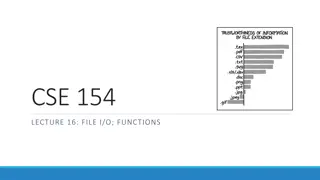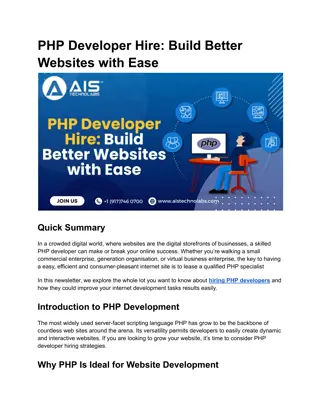
Understanding Research Approaches and Philosophical Worldviews
Explore the three main research approaches - quantitative, qualitative, and mixed methods - along with the components of each approach and philosophical worldviews guiding research. Learn about postpositivist, constructionist, and transformative worldviews in research methodology.
Download Presentation

Please find below an Image/Link to download the presentation.
The content on the website is provided AS IS for your information and personal use only. It may not be sold, licensed, or shared on other websites without obtaining consent from the author. If you encounter any issues during the download, it is possible that the publisher has removed the file from their server.
You are allowed to download the files provided on this website for personal or commercial use, subject to the condition that they are used lawfully. All files are the property of their respective owners.
The content on the website is provided AS IS for your information and personal use only. It may not be sold, licensed, or shared on other websites without obtaining consent from the author.
E N D
Presentation Transcript
Research Approach Week 1
Three Approaches Approach is a plan/proposal to conduct research. On a continuum Quantitative: testing objective theories by examining relationship among variables. Variables can be measured numerically in order to be analyzed statistically. Report structure is set (into, lit. review, theory & method, results, and discussion) Qualitative: exploring and understanding meaning individuals or groups ascribe to social or human problem. Data collected at participant s setting. Data analysis inductively built from particular to general. Report structure flexible. Focus on individual meaning. Mixed methods: collecting and integrating both types of data. Core assumption is that combination of approaches provides more complete understanding than either approach alone.
Components of each approach Philosophical worldview Research Design Research Method
Philosophical worldviews Philosophical worldviews a basic set of beliefs that guide action general philosophical orientations about the world and nature of research that researcher brings to study (Fig.)
Postpositivist worldview Traditional form of research favoring quantitative research Called the scientific method/empirical science Deterministic philosophy in which causes determine effects or outcomes Reductionistic in its intent to reduce ideas into small variables that comprise hypotheses and research questions Research begins with theory, collects data that supports or refutes theory, makes necessary revisions and conducts additional tests
Constructionist worldview Inspired by social constructivism which believes that individuals seek understanding of the world in which they live and work. Thus they develop subjective meanings of their experiences meanings directed toward certain objects or people. Meanings are varied and multiple, leading researcher to look for complexity of views rather than narrowing meanings into few categories or ideas. Researcher s intent is to make sense of (or interpret) the meanings others have about the world. Rather than starting with a theory, inquirers generate or inductively develop a theory or patters of meaning.
Transformative worldview Developed in 1990s, there is no uniform body of literature on this worldview Criticizes Postpositivism for imposing theories that did not favor marginalized individuals in society, issues of power and justice, discrimination, etc. Criticizes Constructivism for not going far enough in advocating for an action agenda to help marginalized people Believe that research inquiry needs to be intertwined with politics and political change to confront social oppression Research should focus on important social issues such as empowerment, inequality, oppression, alienation Participants involved in research process by designing questions, collecting data, analyzing information
Pragmatic worldview Primary concern with applications what works and solutions to problems. Instead of focusing on methods, researchers emphasize the research problem and use all approaches available to understand it Pragmatism is not committed to any one approach; it draws from both quantitative and qualitative approaches Pragmatism does not see the world as an absolute entity. In similar way, mixed method researchers look to many approaches for collecting and analyzing data rather than subscribing to only one way
Research Design 1 Research designs (strategies of inquiry) are types of inquiry within qualitative, quantitative, and mixed methods approach that provide specific direction for procedures in a research design. Quantitative Designs: originated mainly in psychology Surveys: quantitative or numeric description of attitudes, trends or opinions of a population by studying sample of that population Experiments seek to determine if a specific treatment influences an outcome. Qualitative Designs: originated in anthropology Narrative research: researcher studies lives of individuals and asks one or more individuals to provide stories about their lives.
Research Design 2 Qualitative Designs (cont.) Phenomenological research based on interviews in which researcher describes the lived experiences of individuals about a phenomenon as described by participants. Grounded theory: researcher derives a general abstract theory of a process, action or interaction grounded in the views of participants. Involves multiple stages of data collection and refinement. Mixed Methods Designs: built on the idea that all methods have bias and weaknesses. Thus, triangulation was born. Convergent parallel mixed methods: researcher merges quantitative and qualitative data in order to provide a comprehensive analysis of research problem Explanatory sequential mixed methods: researcher first conducts quantitative research, analyses results and then builds on the results to explain them in more detail with qualitative research
Research approach as worldviews, designs and methods Quantitative approach: Postpositivist worldview, experimental design, and pretest and posttest measures of attitudes Qualitative approach: constructivist worldview, ethnographic design, and observation of behavior Qualitative approach: transformative worldview, narrative design, and open-ended interviewing Mixed methods approach: pragmatic worldview, collection of both quantitative and qualitative data sequentially in the design
Criteria for selecting approach Research problem and questions If problem calls for a) ID of factors that influence outcome, b) utility of an intervention, c) understanding the best predictors of outcomes, d) testing theory or explanation >>> then use quantitative approach If concept or phenomena needs to be explored and understood because little research was done >>> then use qualitative approach If neither quantitative or qualitative approaches work by themselves the best >>> then use mixed methods approach Personal Experiences: technical training, skills, past experience Audience: journal editors, faculty committees, conference attendees, etc.
Home assignment Creswell (2014), Chapter 1, p. 22 Choose option 1 or 2






















